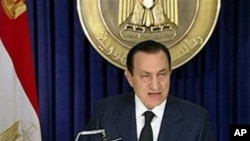Egyptian President Hosni Mubarak has announced an end to his near 30-year rule, telling the nation he will not seek another term in office.
Mr. Mubarak said on state television late Tuesday that he has exhausted his life serving Egypt and its people. He gave no indication of plans to step down or leave the country. Instead, he said he will work during the rest of his term to carry out a "peaceful transfer of power."
The Egyptian leader's announcement instantly drew the wrath of hundreds of thousands of Egyptians who had taken to the streets nationwide in peaceful demonstrations demanding he resign immediately.
|
Listen to VOA's interview with demonstrator Tarek Hefny, who spoke from Cairo's Tahrir Square Recorded before President Mubarak's speech |
In Cairo, an estimated 250,000 people gathered in Tahrir (Liberation) Square, a focal point of the peaceful protests, shouting "Leave. Leave." Many held up their shoes, a sign of disrespect in the Arab world.
Soon after Mr. Mubarak's speech, clashes erupted between protesters and government supporters in the northern port city of Alexandria. At least 12 people were injured. Witnesses reported similar unrest in Suez and other cities east of Cairo.
Pro-democracy advocate Mohamed ElBaradei told the U.S. television network CNN that Mr. Mubarak's decision to remain in power will extend Egypt's "agony" until presidential elections planned for September. He called the move an "act of deception" from someone who "does not want to let go."
Watch a related video report from Cairo by VOA's Luis Ramirez:
Prior to Mr. Mubarak's announcement, U.S. President Barack Obama had urged him not to run for another term, effectively withdrawing American support for its closest Arab ally. The White House said Mr. Obama's message was conveyed by U.S. envoy to Egypt Frank Wisner.
|
Key Players in Egypt's Crisis
|
The 82-year-old Mr. Mubarak insisted his decision not to run had nothing to do with the unprecedented protests that have shaken Egypt for the past week. He said he never intended to be a candidate for another term.
Tens of thousands also joined Tuesday's rallies in Suez, Mansoura and Alexandria.
Demonstrators in the capital carried signs saying "Bye, bye Mubarak" as helicopters flew overhead. Effigies of Mr. Mubarak hung from traffic lights.
Military forces, stationed throughout Cairo, did not interfere with the massive crowd. The army had announced earlier it recognized the "legitimate demands" of the Egyptian people, and it pledged not to fire on protesters.
The U.S. Ambassador in Cairo, Margaret Scobey, spoke by telephone Tuesday to ElBaradei, who has emerged as a central figure of the Egyptian opposition. The country's powerful Muslim Brotherhood, along with a group of smaller, secular parties, has agreed to have the Nobel Peace laureate act as a lead spokesman for the loose coalition.
Officially banned, the Islamist Brotherhood is a wide-ranging social and political organization that fields independent candidates in parliament.
Egypt is one of only two Arab countries to have relations with Israel, and it is a key U.S. ally in fighting Islamic terrorism and standing against Iran and Syria's growing influence in the region.
The movement to drive Mr. Mubarak out has emerged from the work of online activists and is fueled by deep frustration with an autocratic regime blamed for ignoring the needs of the poor and allowing corruption and official abuse to run rampant.
Banks, schools and the stock market remained closed in Egypt for the third working day Tuesday, making cash tight. Bread prices spiraled. An unprecedented Internet cutoff remains in place.
At least 140 people died during protest violence last week.




